大学英语 第二章
- 格式:docx
- 大小:38.24 KB
- 文档页数:7
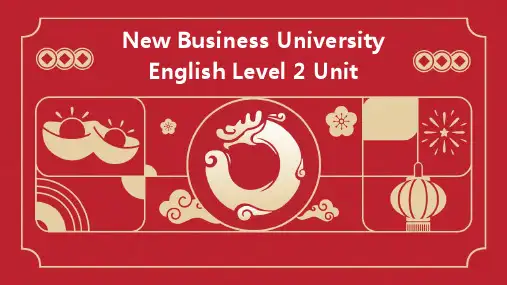
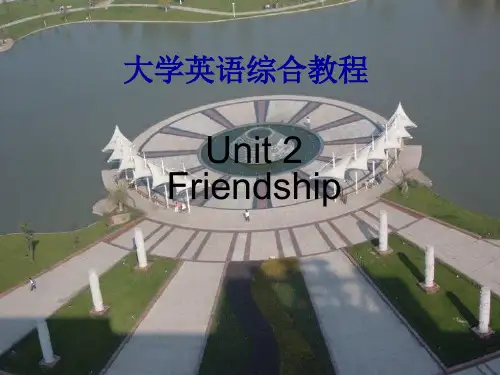
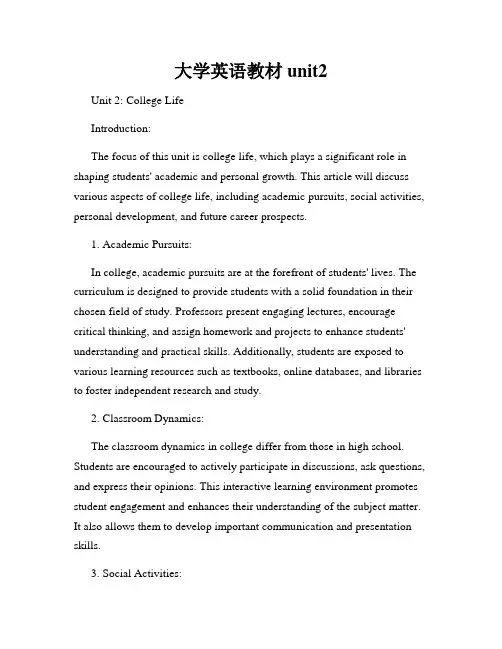
大学英语教材unit2Unit 2: College LifeIntroduction:The focus of this unit is college life, which plays a significant role in shaping students' academic and personal growth. This article will discuss various aspects of college life, including academic pursuits, social activities, personal development, and future career prospects.1. Academic Pursuits:In college, academic pursuits are at the forefront of students' lives. The curriculum is designed to provide students with a solid foundation in their chosen field of study. Professors present engaging lectures, encourage critical thinking, and assign homework and projects to enhance students' understanding and practical skills. Additionally, students are exposed to various learning resources such as textbooks, online databases, and libraries to foster independent research and study.2. Classroom Dynamics:The classroom dynamics in college differ from those in high school. Students are encouraged to actively participate in discussions, ask questions, and express their opinions. This interactive learning environment promotes student engagement and enhances their understanding of the subject matter. It also allows them to develop important communication and presentation skills.3. Social Activities:Apart from their academic commitments, college students engage in various social activities. These activities create opportunities for students to form friendships, develop social networks, and experience personal growth. Student clubs, cultural events, sports teams, and volunteer activities are popular choices for students to actively participate in their college community.4. Personal Development:College life offers a platform for personal growth and self-discovery. Students gain valuable life skills such as time management, organization, and responsibility as they juggle academics, extracurricular activities, and personal commitments. Living away from home and being independent also fosters self-reliance and decision-making abilities.5. Future Career Prospects:One of the primary goals of college education is to prepare students for their future careers. In addition to academic knowledge, college life offers various opportunities for students to develop professional skills. Internships, career fairs, and networking events provide avenues for students to gain practical experience and establish professional connections. Colleges also offer career counseling and guidance to help students explore different career paths and make informed decisions.Conclusion:College life is a transformative period that shapes students academically, socially, and personally. Through academic pursuits, engagement in social activities, personal growth, and future career prospects, students acquire thenecessary skills and experiences to succeed in their chosen fields. The holistic development offered by college life not only prepares students for their professional lives but also helps them become well-rounded individuals.。
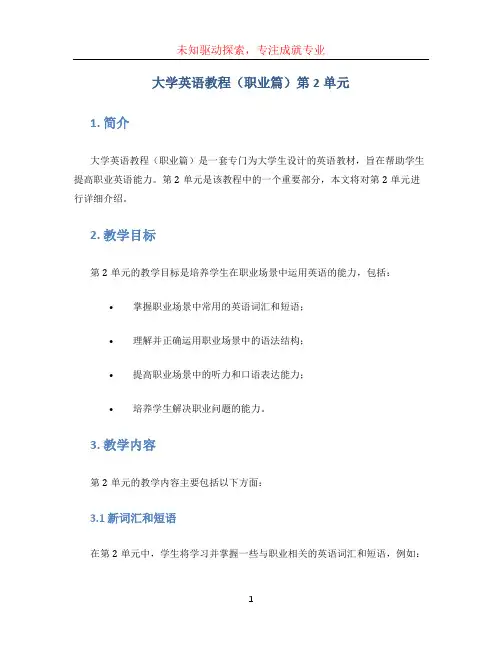
大学英语教程(职业篇)第2单元1. 简介大学英语教程(职业篇)是一套专门为大学生设计的英语教材,旨在帮助学生提高职业英语能力。
第2单元是该教程中的一个重要部分,本文将对第2单元进行详细介绍。
2. 教学目标第2单元的教学目标是培养学生在职业场景中运用英语的能力,包括:•掌握职业场景中常用的英语词汇和短语;•理解并正确运用职业场景中的语法结构;•提高职业场景中的听力和口语表达能力;•培养学生解决职业问题的能力。
3. 教学内容第2单元的教学内容主要包括以下方面:3.1 新词汇和短语在第2单元中,学生将学习并掌握一些与职业相关的英语词汇和短语,例如:•career(职业)•interview(面试)•resume(简历)•promotion(晋升)•colleague(同事)•teamwork(团队合作)•deadline(截止日期)学生将通过课堂讨论、词汇练习和角色扮演等活动来巩固这些词汇。
3.2 语法结构第2单元的语法结构围绕着职业场景展开,学生将学习并掌握一些与职业相关的语法知识,例如:•虚拟语气的运用(用于推测和建议)•条件状语从句的使用(用于描述可能的情况)•定语从句的运用(用于修饰职位和人)学生将通过语法练习和句子构建等活动来巩固这些语法知识。
3.3 听力和口语训练第2单元将通过听力材料和口语训练来提高学生的听力和口语表达能力。
学生将听取与职业场景相关的对话和短文,然后回答问题或进行口头表达。
通过这些练习,学生将培养自己在真实职业环境中的应对能力。
3.4 情景模拟和角色扮演为了让学生更好地运用所学知识,第2单元将组织情景模拟和角色扮演活动。
学生将在教师的指导下,扮演不同的职业角色,模拟职业场景中的对话和交流。
这将锻炼学生的口语表达能力和团队合作能力。
4. 教学方法为了更好地实现教学目标,本单元将采用多种教学方法,包括:•课堂讲授:教师将向学生介绍并解释新的词汇和语法知识。
•课堂讨论:学生将在小组或整个班级一起进行讨论,分享自己的观点和经验。
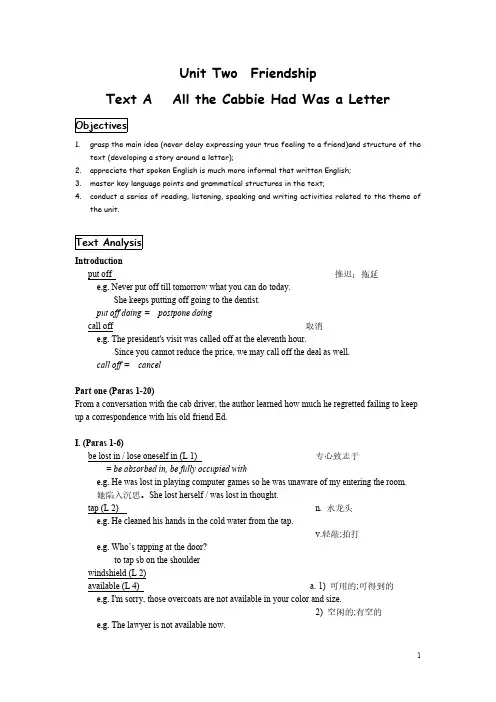
Unit Two FriendshipText A All the Cabbie Had Was a Letter Objectives1.grasp the main idea (never delay expressing your true feeling to a friend)and structure of thetext (developing a story around a letter);2.appreciate that spoken English is much more informal that written English;3.master key language points and grammatical structures in the text;4.conduct a series of reading, listening, speaking and writing activities related to the theme ofthe unit.Text AnalysisIntroductionput off 推迟;拖延e.g. Never put off till tomorrow what you can do today.She keeps putting off going to the dentist.put off doing = postpone doingcall off 取消e.g. The president's visit was called off at the eleventh hour.Since you cannot reduce the price, we may call off the deal as well.call off = cancelPart one (Paras 1-20)From a conversation with the cab driver, the author learned how much he regretted failing to keep up a correspondence with his old friend Ed.I. (Paras 1-6)be lost in / lose oneself in (L 1) 专心致志于= be absorbed in, be fully occupied withe.g. He was lost in playing computer games so he was unaware of my entering the room.她陷入沉思。
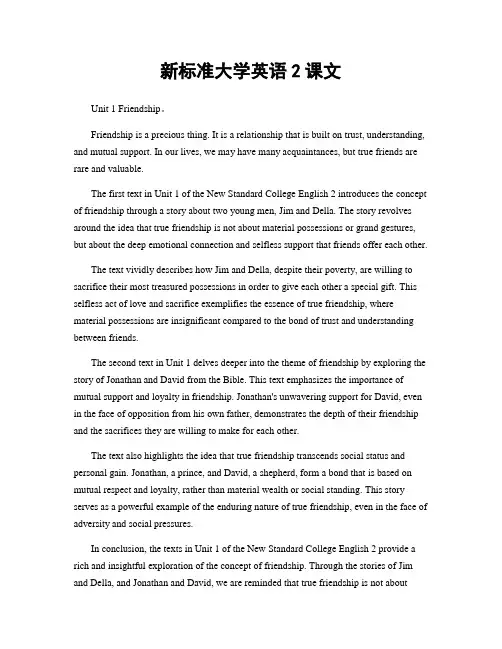
新标准大学英语2课文Unit 1 Friendship。
Friendship is a precious thing. It is a relationship that is built on trust, understanding, and mutual support. In our lives, we may have many acquaintances, but true friends are rare and valuable.The first text in Unit 1 of the New Standard College English 2 introduces the concept of friendship through a story about two young men, Jim and Della. The story revolves around the idea that true friendship is not about material possessions or grand gestures, but about the deep emotional connection and selfless support that friends offer each other.The text vividly describes how Jim and Della, despite their poverty, are willing to sacrifice their most treasured possessions in order to give each other a special gift. This selfless act of love and sacrifice exemplifies the essence of true friendship, where material possessions are insignificant compared to the bond of trust and understanding between friends.The second text in Unit 1 delves deeper into the theme of friendship by exploring the story of Jonathan and David from the Bible. This text emphasizes the importance of mutual support and loyalty in friendship. Jonathan's unwavering support for David, even in the face of opposition from his own father, demonstrates the depth of their friendship and the sacrifices they are willing to make for each other.The text also highlights the idea that true friendship transcends social status and personal gain. Jonathan, a prince, and David, a shepherd, form a bond that is based on mutual respect and loyalty, rather than material wealth or social standing. This story serves as a powerful example of the enduring nature of true friendship, even in the face of adversity and social pressures.In conclusion, the texts in Unit 1 of the New Standard College English 2 provide a rich and insightful exploration of the concept of friendship. Through the stories of Jim and Della, and Jonathan and David, we are reminded that true friendship is not aboutmaterial possessions or social status, but about the deep emotional connection, trust, and selfless support that friends offer each other. These texts serve as a powerful reminder of the value of true friendship in our lives, and the importance of cherishing and nurturing these precious relationships.。
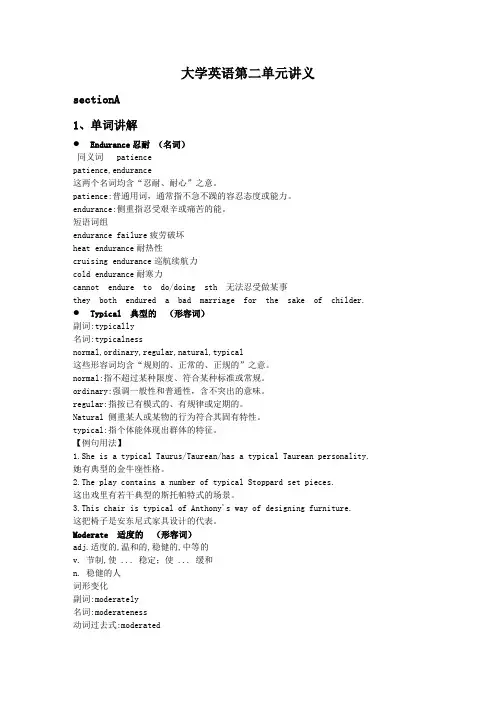
大学英语第二单元讲义sectionA1、单词讲解●Endurance忍耐(名词)同义词 patiencepatience,endurance这两个名词均含“忍耐、耐心”之意。
patience:普通用词,通常指不急不躁的容忍态度或能力。
endurance:侧重指忍受艰辛或痛苦的能。
短语词组endurance failure疲劳破坏heat endurance耐热性cruising endurance巡航续航力cold endurance耐寒力cannot endure to do/doing sth 无法忍受做某事they both endured a bad marriage for the sake of childer.●Typical 典型的(形容词)副词:typically名词:typicalnessnormal,ordinary,regular,natural,typical这些形容词均含“规则的、正常的、正规的”之意。
normal:指不超过某种限度、符合某种标准或常规。
ordinary:强调一般性和普通性,含不突出的意味。
regular:指按已有模式的、有规律或定期的。
Natural 侧重某人或某物的行为符合其固有特性。
typical:指个体能体现出群体的特征。
【例句用法】1.She is a typical Taurus/Taurean/has a typical Taurean personality. 她有典型的金牛座性格。
2.The play contains a number of typical Stoppard set pieces.这出戏里有若干典型的斯托帕特式的场景。
3.This chair is typical of Anthony's way of designing furniture.这把椅子是安东尼式家具设计的代表。
Moderate 适度的(形容词)adj.适度的,温和的,稳健的,中等的v. 节制,使 ... 稳定;使 ... 缓和n. 稳健的人词形变化副词:moderately名词:moderateness动词过去式:moderated动词过去分词:moderated动词现在分词:moderating动词第三人称单数:moderatesEvidence 证据(名词)动词过去式:evidenced动词过去分词:evidenced动词现在分词:evidencing动词第三人称单数:evidence名词n.1.证据;证词;证人;物证[U][(+of/for)][+that][+to-v]He was punished for giving false evidence.他因作伪证而受到惩罚。
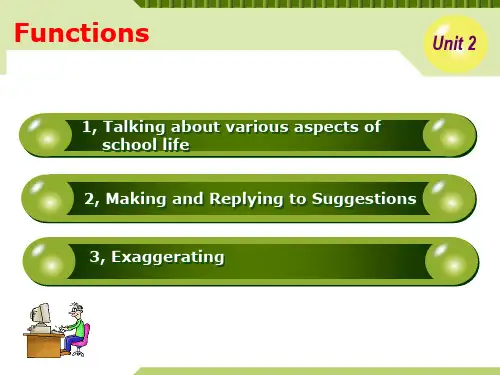
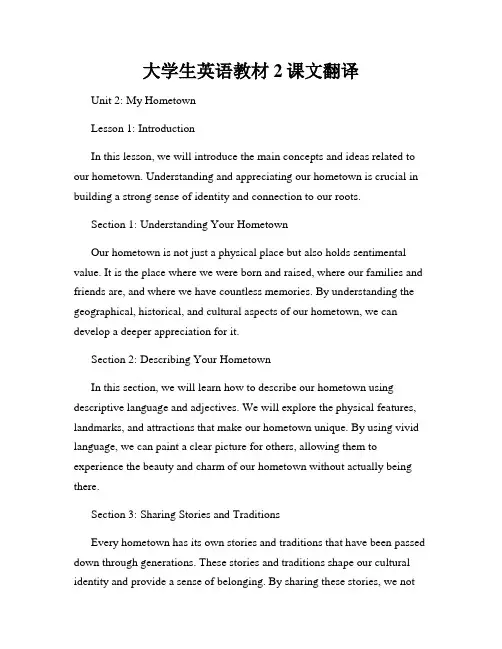
大学生英语教材2课文翻译Unit 2: My HometownLesson 1: IntroductionIn this lesson, we will introduce the main concepts and ideas related to our hometown. Understanding and appreciating our hometown is crucial in building a strong sense of identity and connection to our roots.Section 1: Understanding Your HometownOur hometown is not just a physical place but also holds sentimental value. It is the place where we were born and raised, where our families and friends are, and where we have countless memories. By understanding the geographical, historical, and cultural aspects of our hometown, we can develop a deeper appreciation for it.Section 2: Describing Your HometownIn this section, we will learn how to describe our hometown using descriptive language and adjectives. We will explore the physical features, landmarks, and attractions that make our hometown unique. By using vivid language, we can paint a clear picture for others, allowing them to experience the beauty and charm of our hometown without actually being there.Section 3: Sharing Stories and TraditionsEvery hometown has its own stories and traditions that have been passed down through generations. These stories and traditions shape our cultural identity and provide a sense of belonging. By sharing these stories, we notonly preserve our heritage but also give others a glimpse into the rich history of our hometown.Section 4: Comparing HometownsIn this section, we will compare our hometowns with those of our classmates. By understanding the similarities and differences, we can broaden our perspective and gain a better understanding of the world. This exercise encourages cultural exchange and fosters a deep appreciation for diversity.Lesson 2: My Hometown's HistoryIn this lesson, we will delve deeper into the historical aspect of our hometowns. Learning about the historical events and figures that have shaped our hometowns helps us develop a better understanding of our heritage.Section 1: Historical TimelineWe will create a historical timeline of our hometown, starting from its foundation to the present day. By examining key events and influential figures, we can see how our hometown has evolved over time. This exercise highlights the importance of preserving historical records and cherishing our cultural heritage.Section 2: Historical LandmarksEvery hometown has historical landmarks that serve as a reminder of its past. We will explore these landmarks, their significance, and how theycontribute to the overall identity of our hometown. By appreciating these landmarks, we can develop a sense of pride and inspire others to do the same.Section 3: Local Legends and HeroesMany hometowns have their own local legends and heroes, whose stories have become a part of their folklore. We will explore these legends and heroes, discovering the values they embody and the lessons they teach. By celebrating these figures, we ensure that their legacies are not forgotten and continue to inspire future generations.Lesson 3: Celebrating Our HometownIn this lesson, we will focus on the various festivals, traditions, and celebrations that take place in our hometown. These cultural events not only provide entertainment but also serve as a platform for preserving and promoting our local traditions.Section 1: Festivals and CelebrationsWe will explore the different festivals and celebrations that are unique to our hometown. By understanding the significance behind these events, we can actively participate and promote them to ensure their continuity. These festivals provide an opportunity for locals and visitors alike to come together and experience the vibrancy of our hometown's culture.Section 2: Local CuisineFood plays a significant role in any culture, and our hometown's cuisine is no exception. We will showcase the distinctive dishes and culinary traditions that are native to our hometown. By sharing these recipes andstories, we can introduce our hometown's flavors to a wider audience and keep our culinary heritage alive.Section 3: Traditional Arts and CraftsTraditional arts and crafts are an integral part of our hometown's cultural heritage. We will explore the various artistic mediums and craftsmanship that have been passed down through generations. By showcasing these talents, we can preserve our traditional arts and crafts and support local artisans.ConclusionUnderstanding and celebrating our hometown is a way to honor our roots and preserve our cultural heritage. By exploring its history, traditions, and attractions, we can develop a stronger sense of identity and foster a connection to our homeland. Let us embrace and share the beauty of our hometowns, allowing others to appreciate their uniqueness and fostering a sense of unity and cultural exchange.。
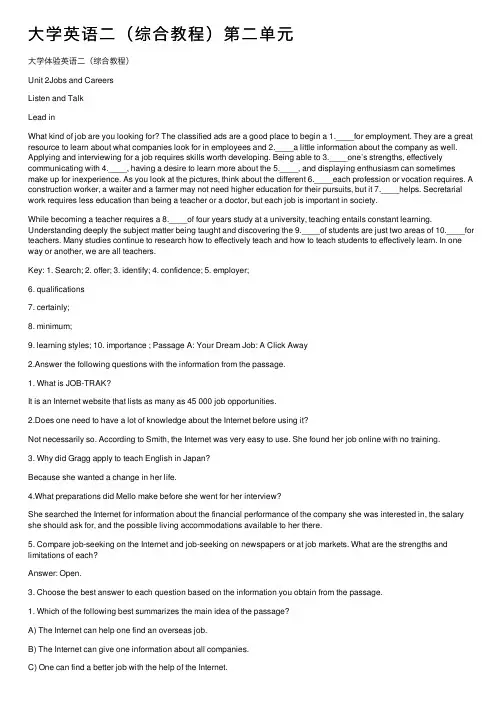
⼤学英语⼆(综合教程)第⼆单元⼤学体验英语⼆(综合教程)Unit 2Jobs and CareersListen and TalkLead inWhat kind of job are you looking for? The classified ads are a good place to begin a 1.____for employment. They are a great resource to learn about what companies look for in employees and 2.____a little information about the company as well. Applying and interviewing for a job requires skills worth developing. Being able to 3.____one’s strengths, effectively communicating with 4.____, having a desire to learn more about the 5.____, and displaying enthusiasm can sometimes make up for inexperience. As you look at the pictures, think about the different 6.____each profession or vocation requires. A construction worker, a waiter and a farmer may not need higher education for their pursuits, but it 7.____helps. Secretarial work requires less education than being a teacher or a doctor, but each job is important in society.While becoming a teacher requires a 8.____of four years study at a university, teaching entails constant learning. Understanding deeply the subject matter being taught and discovering the 9.____of students are just two areas of 10.____for teachers. Many studies continue to research how to effectively teach and how to teach students to effectively learn. In one way or another, we are all teachers.Key: 1. Search; 2. offer; 3. identify; 4. confidence; 5. employer;6. qualifications7. certainly;8. minimum;9. learning styles; 10. importance ; Passage A: Your Dream Job: A Click Away2.Answer the following questions with the information from the passage.1. What is JOB-TRAK?It is an Internet website that lists as many as 45 000 job opportunities.2.Does one need to have a lot of knowledge about the Internet before using it?Not necessarily so. According to Smith, the Internet was very easy to use. She found her job online with no training.3. Why did Gragg apply to teach English in Japan?Because she wanted a change in her life.4.What preparations did Mello make before she went for her interview?She searched the Internet for information about the financial performance of the company she was interested in, the salary she should ask for, and the possible living accommodations available to her there.5. Compare job-seeking on the Internet and job-seeking on newspapers or at job markets. What are the strengths and limitations of each?Answer: Open.3. Choose the best answer to each question based on the information you obtain from the passage.1. Which of the following best summarizes the main idea of the passage?A) The Internet can help one find an overseas job.B) The Internet can give one information about all companies.C) One can find a better job with the help of the Internet.D) There are many employment websites one can turn to for help.2. "To click one's way into a job" means __________.A) to find a job by searching the InternetB) to get a job by clicking a mouseC) to access the job websiteD) to know the way to do one's job3. It can be inferred that __________ .A) originally only job vacancies in high-tech fields were listed on the InternetB) most newspapers and publications don't have a section of classified listingsC) many companies are using the Internet as their management assistantsD) many people can get a job offer now without going through an interview4. Dozlic found a better job __________.A) while browsing a website for baseball tradesB) by casually checking out an online classified adC) because of his curiosity about the InternetD) because of the experience he obtained from other jobs5. Mello searched the Internet for all the following information except __________.A) job vacanciesB) a company's financial performanceC) the minimum salaryD) rental propertiesAnswer: 1.C, 2.A, 3.A, 4.A, 5.C4. Fill in the blanks with the words given below. Change the form where necessary.1. I'm absolutely sure that this dress is a cheaper ____ of the one we saw in that department store.2. The bookshelves were crowded with books and scientific ____ .3. If you want to open a file, ____ twice on the icon(图标)for it.4. To their disappointment, the thieves were ____ by the police at the moment they were enteringthe bank.5. During World War II, many ____ fled to the United States.6. They've updated(更新) a lot of _____ in the most recent edition of the dictionary.7. Despite _____ difficulties,they did not find the life in London unpleasant.8. After a lot of part-time jobs, John finally got a ____ position.9. In your report, you should give a _____ description of the whole incident.10. Companies publish ____ reports to inform the public about the previous year's activities Anwser: 1.version, 2.publications, 3.click, 4.spotted, 5.refugees,6.entries,7.financial,8.full-time,9.detailed, 10.annual5. Complete the following sentences with phrases or expressions from the passage.Change the form where necessary.1. At the age of 29, he ____ a commercial property business.2. While she was tidying up the living room, she ____ her old photograph album.3. My doctor ____ me ____ a specialist in heart disease.4. He hired private investigators to ____ his future business partner.5. She only _____ her son's marriage long after the event.Answer: 1.set up, 2.came across, 3.referred...to , 4.check out, 5.learnt of / learned of6. Choose an appropriate noun given in the following box to complete each of the sentences.1. She is now concentrating on a/an ___ as a fashion designer.2.When I went for my first ___ for this job I arrived extremely early.3.Police insisted that Michael did not follow the correct ____ in applying for a visa.4.We organized a/an ____ of recent book upon constant requests from the readers.5.The newspaper publishes a/an ____ of a leading sportsman every week.Answer: 1.career 2.interview 3.procedure 4.exhibit 5.profile7.Translate the following sentences into English.1. 警察们正忙着填写关于这场事故的各种表格。

I. 语言重点(Language Focus)1. 重点词汇与短语case, male, score, vocabulary, stage, act, block, repeat, language, physical, therefore, energy, independent, produce, factor, style, presentation, formula, logic, strength, paragraph, linguistic, quote, apply, visual, comprehension, instruction, relate, benefit, tend to, on average, find out, be caused by2. 技能要求(Skills Development)1) 听说(Listening and Speaking)能听懂和回答老师的有关本单元内容的提问。
2) 读译(Reading and Translating)要求学生能熟读对话与课文,背诵课文对话语句,增强学生的表达能力。
3) 写(Writing)鼓励学生用所学的单词、词组和句型来书写书信。
II. Language PointsDialogue1. I just dropped in to say goodbye,LiMing.drop in: 顺便走访, 不预先通知的拜访eg. Remember to drop in tonight. 记住今晚来。
Please drop in again. 请再次光临。
2. Now ZhangJie is leaving for California,USA. to study.leave for: 到.去, 出发前往eg. He has left for Washington.他已经去华盛顿了。
·12·大学实用英语①I asked for leave. 我请假了。
大学英语教材2第二单元Unit 2: Talking about Daily RoutinesI. IntroductionIn the second unit of the college English textbook 2, we will focus on talking about daily routines. This unit will help students expand their vocabulary related to daily activities, as well as develop their speaking and writing skills. By the end of this unit, students will be able to communicate proficiently about their daily routines and describe their typical day.II. VocabularyTo effectively communicate about daily routines, it is essential to have a strong vocabulary base. Here are some key vocabulary words related to daily activities:1. Wake up2. Brush teeth3. Take a shower4. Get dressed5. Have breakfast6. Attend classes7. Study8. Go to the library9. Have lunch10. Relax11. Exercise12. Cook dinner13. Watch TV14. Read15. Go to bedIII. GrammarIn this unit, we will also learn about the use of simple present tense to talk about habitual actions. The simple present tense is commonly used to describe routines, habits, and general truths. For example:1. I wake up at 6 am every day.2. She brushes her teeth twice a day.3. They attend classes from Monday to Friday.IV. Speaking PracticeTo enhance speaking skills, we will engage in various speaking activities, such as role plays and group discussions. Students will have the opportunity to practice asking and answering questions about daily routines. They will also learn to express their preferences and opinions regarding different activities.V. Writing PracticeIn the writing component of this unit, students will be asked to write a descriptive paragraph about their typical day. They will incorporate the vocabulary and grammar structures learned throughout the unit to create a well-organized and coherent piece of writing. Students will be encouraged to pay attention to proper sentence structure and to use appropriate transition words to connect their ideas.VI. Listening and Reading ComprehensionTo improve their listening and reading skills, students will listen to audio recordings and read texts related to daily routines. They will develop their ability to understand spoken and written English in different contexts, while also familiarizing themselves with the vocabulary and grammatical structures used in the unit.VII. Cultural AwarenessIn addition to language skills, this unit also aims to broaden students' cultural awareness. They will learn about daily routines in different countries and appreciate the diversity of lifestyles around the world. This cross-cultural understanding will enhance their global perspective and empathy towards others.VIII. ConclusionThe second unit of the college English textbook 2 provides students with the necessary tools and knowledge to discuss daily routines confidently. Through vocabulary expansion, grammar practice, speaking and writing activities, and exposure to various cultural aspects, students will further develop their English communication skills. By the end of this unit, studentswill have a solid foundation in talking about daily routines and will be better equipped to engage in conversations about their own lives and experiences.Note: This article is a sample and may not align exactly with the content of Unit 2 in the actual college English textbook 2. It is important to refer to the specific textbook for accurate information.。
大学英语教材2笔记第一章:词汇与语法在大学英语教材2中,第一章主要介绍了词汇与语法相关内容。
学习这章内容的目的是帮助学生掌握英语基本的词汇和语法规则,为后续学习打下基础。
1.1 词汇学习在词汇学习的部分,教材着重讲解了如何扩大词汇量。
学生可以通过多读英语文章、定期背诵单词、使用词汇学习工具等方式来提升自己的词汇水平。
教材给出了一些建议,并提供了相关的练习题供学生巩固所学内容。
1.2 语法规则语法规则是英语学习中的重要组成部分。
在教材中,对于不同的语法规则进行了详细的介绍和解释,例如时态、语态、句子结构等。
学生需要通过大量的练习来熟悉和掌握这些规则,并能够正确运用于实际交流中。
第二章:听力与口语第二章主要围绕听力和口语两个方面展开,旨在提高学生的听力理解能力和口语表达能力。
2.1 听力训练听力训练是提高听力能力的有效途径之一。
教材中提供了大量的听力材料,包括对话、新闻、讲座等,以帮助学生听懂并理解不同语速和语调的英语音频。
通过多次听取、模仿和分析,学生可以逐渐提高自己的听力技巧。
2.2 口语训练口语是实际交流中最为常用的表达方式之一。
在口语训练中,教材提供了一系列的口语练习,包括日常对话、演讲、辩论等。
学生需要通过模仿、练习和与他人的互动来提高自己的口语表达能力。
同时,教材还提供了一些常用口语表达和技巧,供学生参考和运用。
第三章:阅读与写作第三章的内容主要是阅读和写作的训练,旨在培养学生的阅读理解和写作能力。
3.1 阅读训练阅读是扩大词汇量、提高语言理解能力的有效方法之一。
在阅读训练中,教材提供了一系列的阅读材料,包括文章、新闻、故事等。
学生需要通过阅读并回答相关问题来检验自己的理解能力,并从中学习和积累语言知识。
3.2 写作训练写作是语言表达的重要形式之一。
在写作训练中,教材引导学生从构思、组织到表达,逐步提高他们的写作能力。
教材提供了写作范文以及相关的写作指导,使学生能够更好地掌握写作技巧和表达方式。
大学生英语教材2unit2Unit 2: University LifeIntroduction:University life is an exciting and crucial phase in a student's journey towards higher education. In this unit, we will explore various aspects of university life, focusing on the experiences and challenges faced by modern-day college students. Through this article, we aim to provide valuable insights into the importance of English language learning in a university setting.1. Academic Demands:In this section, we will delve into the academic demands that students face in university. It is crucial for students to adapt to the new learning environment, including attending lectures, participating in tutorials, and conducting research. English language proficiency plays a vital role in ensuring effective communication with professors and classmates, as well as in the completion of assignments and examinations.2. Campus Culture and Social Life:University is not only about academics; it is also an opportunity for personal growth and social development. This section will discuss the various aspects of campus culture, such as student clubs, extracurricular activities, and social events. English language skills enable students to engage in meaningful conversations, form friendships, and actively participate in the diverse campus community.3. Study Skills and Time Management:University life often presents students with a higher level of independence and responsibility. Developing effective study skills and time management techniques is paramount to succeed academically. In this section, we will explore strategies for efficient note-taking, exam preparation, and organizing study schedules. Effective English language skills can enhance students' ability to comprehend and engage with study materials, aiding them in achieving academic success.4. Career Preparation:As students progress through their university journey, thoughts of future careers become increasingly important. This section will highlight the role of English language skills in career preparation. Proficiency in the English language is highly valued by employers in today's globalized job market. We will discuss how English language proficiency can enhance students' professional prospects through internships, job interviews, and networking opportunities.5. Challenges and Support Systems:University life is not without its challenges. This section will address the common difficulties faced by students, such as homesickness, stress, and academic pressure. It is crucial for students to seek support from various university resources, including academic counselors, peer support groups, and language centers. English language skills are essential in effectively communicating their concerns to seek appropriate assistance.Conclusion:In conclusion, Unit 2 provides essential insights into the diverse aspects of university life for students. The importance of English language learning in navigating the academic, social, and professional spheres of university is highlighted throughout the article. By actively engaging in English language learning, students can maximize their potential and fully embrace the enriching experiences offered by their university journey.。
第二章语法知识历次考试语法考测重点主要是考察一些基础语法一些难点考试中较少涉及:如:虚拟语气、倒装句、复杂的从句(同位语从句、让步状语从句)、分词短语、比较偏的辨析等等语法知识讲解及练习一.动词的基本时态知识要点1.一般现在时态形式为do 或does (第三人称单数)。
通常表示客观事实或真理;或表示经常发生的、习惯性的动作或存在的状态。
e.g. The earth moves around the sun.地球绕着太阳转。
He always goes to school by bike.他总是骑车去上学。
(特别提醒:.一般现在时可以代替将来时,用于时间和条件状语从句中。
)e.g. Please be sure to telephone me the next time you come. 下次来之前请一定给我来电话。
2.一般过去时态形式为did. 表示过去时间所发生的动作或存在的状态,常与过去特定的时间状语连用;或表示过去某一段时间一直持续或反复发生的动作,可与表示频度的时间副词连用。
e.g. I bought this computer five years ago.He often took a walk after supper when he was alive.3.一般将来时态形式为will / shall do 或 be going to do. 表示在未来某个时间将要发生的动作或存在的状态。
e.g. The telephone is ringing. I will answer it.电话在响,我去接。
4.现在进行时态形式为is/am/are+ doing,表示此时此刻或现阶段正在进行的动作。
e.g. The police are looking for the two missing children.警察们正在寻找两个丢失的孩子。
5.过去进行时态形式为 was/were + doing,表示过去某个时刻正在进行的动作。
e.g. Jane burnt her hand when she was cooking the dinner.6.现在完成时态形式为have / has done,常与already,never,ever, yet连用。
用来表示过去发生的对现在有影响的动作。
e.g. The milk has already become undrinkable 牛奶已经不能喝了。
或者表示过去某时间开始一直延续到现在的动作。
e.g. He has lived here since 1949.自从1949年以来,他一直住在这儿。
7.过去完成时形式为had done. 表示在过去某一时刻以前已经开始并一直延续到这一时刻、或是在此刻前已经完成的动作。
e.g.By the end of last term we had learned 1000 English words.到上学期末我们已经学了1000个英语单词。
例题讲解1)Ever since the Smiths moved to the suburbs a year ago they better health.A. could have enjoyedB. had enjoyedC. have been enjoyingD. are enjoying解析:史密斯夫妇一年前搬到郊外是过去的事,他们身体更健康是从那以后一直到现在存在而且还要存在下去的事,所以用现在完成进行时。
答案是C。
2)Her sun-tanned face suggested that she in excellent health.A. beB. isC. wasD. were解析:关键词是“suggested”,如果作“建议”讲,后面应使用虚拟语态用A ;但作“暗示/提示”讲,就不该用虚拟语态,”suggested”用的是过去时,为求时态一致性,答案是C。
3)Neither of the young men who had applied for a position in the university ________ .A. has been acceptedB. have been acceptedC. was acceptedD. were accepted解析:答案A, B都是完成时被动式,C, D都是过去时被动式。
题干“who had applied/递了申请”动作在前,是过去完成时,“被接受”的动作在后,当然应该用完成时,所以答案是B。
二.动词的语态动词的语态表示主语和谓语之间的关系。
英语有两种语态:主动语态表示主语是谓语动作的执行者,被动语态表示主语是谓语动作的承受者。
被动语态的形式:be+过去分词;通常当不知道或不必知道动作的执行者时;当强调动作的承受者时;或者当不愿意说出动作的执行者时用被动语态。
例如His life story is well known to all the neighbors.The TV was turned on and everybody sat there, watching it.例题讲解If the building project by the end of this month is delayed, the construction company will be fined.A. being completedB. is completedC. to be completedD. completed解析:题干中“project”是主语,“is delayed”是谓语,所以名词“project”的动词“complete”只能用它的不定式形式作定语,又因为名词“project/工程” 与动词“complete/完成”之间是被动关系,故只能用C答案。
三.非谓语动词在英语中,不作句子谓语,而具有除谓语外其他语法功能的动词,叫做非谓语动词。
非谓语动词包括动词不定式、动名词、现在分词、过去分词;有一般时、进行时和完成时三种形式以及相应的主动与被动语态。
知识要点1.动词不定式和动名词都可作主语。
e.g. Seeing is believing. 眼见为实。
To refus e him is not easy this time. 这次很难拒绝他。
注意:常用it作形式主语,而将动词不定式放在谓语后面。
e.g. It is human to want something better. 精益求精是人的特性。
2.动词不定式和动名词都可作宾语。
1)有些及物动词只能用不定式作宾语,如:hope,want,wish,decide,manage等:e.g. We all hope to see you. 我们都希望见到你。
2)有些及物动词只能用动名词作宾语,如:finish, avoid, enjoy, mind, insist on 等:e.g. He has finished doing his work.他已经干完了他的工作。
3)有的及物动词既可用不定式,也可用动名词,但其意义有所不同。
如:remember, forget, regret, stop…e.g. I forgot to take aspirin this morning.. 我上午忘了吃阿斯匹林了(但现在想起来了)。
I forgot taking aspirin and took it again a few minutes ago. 我忘了吃过阿司匹林,几分钟以前又吃了一次。
3.动词不定式和分词作补足语。
e.g. I saw the boy climb the wall. 我看见小孩爬墙了。
(强调爬墙这件事)I saw the boy climbing the wall.我看见小孩在爬墙。
(强调爬墙的情景)注意:现在分词作补足语,它与被补足的词之间是主动关系;过去分次作补足语,它与被补足的词之间是被动关系。
如:e.g. I heard someone calling me.I heard my name called. 我听见有人喊我。
4.非谓语动词作状语时,尤其是分词作状语时,要注意分词的逻辑主语必须和句子的主语一致。
现在分词表示的动作和句子的主语之间是主动关系,过去分词表示的动作和句子的主语间是被动关系。
e.g. Working in the factory, he was an advanced worker.在工厂工作时,他是一名先进工人。
Seen from the hill, our school looks more beautiful.从小山上看,我们学校显得更美丽了。
5.非谓语动词也有否定结构和时态/语态。
非谓语动词的否定结构是在它们前面加not来构成。
e.g. They decide not to go.他们决定不去。
Tom’s not passing the exam made his father very angry.汤姆考试没有及格,这令他父亲非常生气。
Having finished the work he went home.干完活后他回家了。
(分词having finished发生在went前)6. 独立主格:当伴随的情况中的主语与主句中的主语不一致时,伴随情况从句要:1)带有逻辑上的主语,2)逻辑主语的谓语部分不同于一般的动词,而使用分词(-ing 或-ed)。
3)不要连词。
比较:Because my mother is sick, I cannot attend the conference.My mother being sick, I cannot attend the conference.Because my arm was injured, I cannot attend the conference.My arm injured, I cannot attend the conference.______, we decided to leave at once, as we didn't want to risk missing the bus.A. As it being pretty late B .It being pretty lateC. It was being pretty lateD. Being pretty late时间已晚,我们决定立即动身,因为我们不想错过这班公交车。
题中原句的意思是: it is pretty late, ……用来说明我们为什么要立即动身的理由,有三种办法表达这种意思:1)用原因状语从句 Since it is pretty late, we decided to …2)分两句讲:It is pretty late. We decided to …3)用独立主格:It (指时间) being pretty late, we decided to …例题讲解1.Air pollution , this city is still a good place to live in.A. being greatly reducedB. greatly being reducedC. to greatly reduceD. greatly to reduce解析:选A,使“Air pollution being greatly reduced,” 成为一个独立主格结构,“air” 与分词“being reduced” 是被动关系。